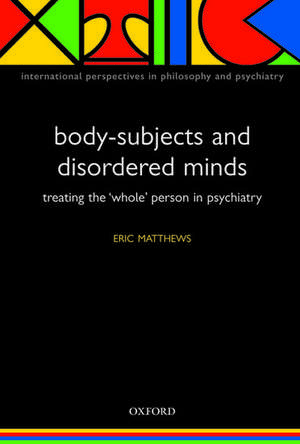Body-Subjects and Disordered Minds: Treating the whole person in psychiatry: International Perspectives in Philosophy & Psychiatry
Autor Eric Matthewsen Limba Engleză Paperback – 4 ian 2007
| Toate formatele și edițiile | Preț | Express |
|---|---|---|
| Paperback (1) | 375.59 lei 31-38 zile | |
| OUP OXFORD – 4 ian 2007 | 375.59 lei 31-38 zile | |
| Hardback (1) | 871.89 lei 31-38 zile | |
| OUP OXFORD – 4 ian 2007 | 871.89 lei 31-38 zile |
Din seria International Perspectives in Philosophy & Psychiatry
- 5%
 Preț: 552.58 lei
Preț: 552.58 lei - 13%
 Preț: 322.49 lei
Preț: 322.49 lei - 24%
 Preț: 542.84 lei
Preț: 542.84 lei - 24%
 Preț: 541.08 lei
Preț: 541.08 lei - 23%
 Preț: 476.22 lei
Preț: 476.22 lei - 23%
 Preț: 543.69 lei
Preț: 543.69 lei - 23%
 Preț: 498.95 lei
Preț: 498.95 lei - 23%
 Preț: 544.39 lei
Preț: 544.39 lei - 24%
 Preț: 471.81 lei
Preț: 471.81 lei - 23%
 Preț: 413.41 lei
Preț: 413.41 lei - 23%
 Preț: 475.08 lei
Preț: 475.08 lei - 18%
 Preț: 364.04 lei
Preț: 364.04 lei - 18%
 Preț: 516.69 lei
Preț: 516.69 lei - 24%
 Preț: 458.13 lei
Preț: 458.13 lei - 14%
 Preț: 327.50 lei
Preț: 327.50 lei - 27%
 Preț: 566.67 lei
Preț: 566.67 lei - 23%
 Preț: 465.20 lei
Preț: 465.20 lei - 28%
 Preț: 481.03 lei
Preț: 481.03 lei - 23%
 Preț: 383.99 lei
Preț: 383.99 lei - 28%
 Preț: 424.71 lei
Preț: 424.71 lei - 24%
 Preț: 540.23 lei
Preț: 540.23 lei - 27%
 Preț: 340.88 lei
Preț: 340.88 lei - 14%
 Preț: 560.55 lei
Preț: 560.55 lei - 22%
 Preț: 578.19 lei
Preț: 578.19 lei - 23%
 Preț: 365.13 lei
Preț: 365.13 lei - 41%
 Preț: 294.77 lei
Preț: 294.77 lei - 27%
 Preț: 341.49 lei
Preț: 341.49 lei - 27%
 Preț: 432.12 lei
Preț: 432.12 lei - 19%
 Preț: 413.64 lei
Preț: 413.64 lei - 14%
 Preț: 482.19 lei
Preț: 482.19 lei - 23%
 Preț: 510.02 lei
Preț: 510.02 lei - 20%
 Preț: 592.34 lei
Preț: 592.34 lei - 23%
 Preț: 442.80 lei
Preț: 442.80 lei - 19%
 Preț: 323.05 lei
Preț: 323.05 lei - 25%
 Preț: 522.30 lei
Preț: 522.30 lei - 19%
 Preț: 403.13 lei
Preț: 403.13 lei - 19%
 Preț: 456.39 lei
Preț: 456.39 lei - 23%
 Preț: 384.56 lei
Preț: 384.56 lei - 14%
 Preț: 495.37 lei
Preț: 495.37 lei - 19%
 Preț: 528.27 lei
Preț: 528.27 lei - 17%
 Preț: 475.11 lei
Preț: 475.11 lei - 14%
 Preț: 386.21 lei
Preț: 386.21 lei - 24%
 Preț: 381.69 lei
Preț: 381.69 lei - 23%
 Preț: 393.35 lei
Preț: 393.35 lei - 27%
 Preț: 327.31 lei
Preț: 327.31 lei
Preț: 375.59 lei
Preț vechi: 490.43 lei
-23% Nou
Puncte Express: 563
Preț estimativ în valută:
71.87€ • 75.04$ • 59.48£
71.87€ • 75.04$ • 59.48£
Carte tipărită la comandă
Livrare economică 24-31 martie
Preluare comenzi: 021 569.72.76
Specificații
ISBN-13: 9780198566441
ISBN-10: 0198566441
Pagini: 200
Dimensiuni: 160 x 230 x 12 mm
Greutate: 0.33 kg
Editura: OUP OXFORD
Colecția OUP Oxford
Seria International Perspectives in Philosophy & Psychiatry
Locul publicării:Oxford, United Kingdom
ISBN-10: 0198566441
Pagini: 200
Dimensiuni: 160 x 230 x 12 mm
Greutate: 0.33 kg
Editura: OUP OXFORD
Colecția OUP Oxford
Seria International Perspectives in Philosophy & Psychiatry
Locul publicării:Oxford, United Kingdom
Recenzii
This is a valuable review of philosophical approaches to mental illness tha is both clear and critical. The respectful approach to persons is increasingly important when our media presents stories of situations in which failures in our mental health system have led to tragedy.
Notă biografică
Eric Matthews was born in Liverpool in 1936. He studied philosophy, both as an undergraduate and a postgraduate, at St John's College, Oxford, from 1957 to 1963, where he was taught by Paul Grice, Gilbert Ryle, and A.J. Ayer. He then taught philosophy for almost forty years at the University of Aberdeen, apart from visiting posts at the University of New Orleans and at the College of Wooster, Ohio, U.S.A. He has a longstanding interest in the philosophical and ethical problems arising from psychiatry: he is a member of the National Committee of the Royal College of Psychiatrists Philosophy Special Interest Group and was a member of the Steering Committee of the International Network for Philosophy and Psychiatry. In 2002, he retired from a Personal Chair of Philosophy at Aberdeen, and is now Emeritus Professor of Philosophy and Honorary Research Professor of Medical and Psychiatric Ethics at the University.
























